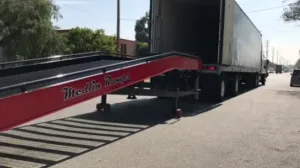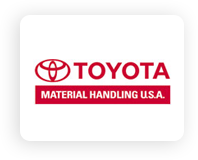Optimizing Warehouse Operations: The Benefits of Renting Ramps
When you own or manage a warehouse, one of the primary challenges is acquiring the necessary equipment to facilitate efficient loading and unloading processes. This often involves purchasing various pieces of equipment, which can strain your budget. However, there’s a cost-effective alternative: renting equipment such as yard ramps and ground-to-dock ramps for short-term needs.
Why Rent a Ramp?
 Renting a ramp serves several crucial purposes in a warehouse setting. Primarily, it facilitates the swift loading and unloading of trailers and allows for the movement of large shipping containers within your warehouse. These ramps also provide access to elevated loading docks, enhancing accessibility and operational efficiency.
Renting a ramp serves several crucial purposes in a warehouse setting. Primarily, it facilitates the swift loading and unloading of trailers and allows for the movement of large shipping containers within your warehouse. These ramps also provide access to elevated loading docks, enhancing accessibility and operational efficiency.
Another significant benefit of renting ramps is flexibility. Depending on your warehouse’s specific needs, you can choose from different types of ramps tailored for various applications. Portable ramps, for instance, offer versatility and can be easily relocated within your facility as needed. On the other hand, heavy-duty ramps are designed to withstand the rigorous demands of heavy machinery like forklifts and pallet jacks, making them ideal for warehouses handling substantial loads.
Key Considerations Before Renting
Efficient material handling is critical for optimizing warehouse operations. It involves the systematic storage, movement, and protection of goods within the facility. Streamlining these processes not only improves customer satisfaction by ensuring timely deliveries but also minimizes operational costs associated with delays and inefficiencies.
Before deciding to rent a ramp, assess your warehouse’s specific material handling needs. Consider factors such as the types of goods you handle, the frequency of loading and unloading operations, and the equipment (like forklifts) that will be using the ramp. This evaluation will help determine the appropriate ramp type, size, and weight capacity required to support your operations effectively.
Types of Ramps Available
There’s a wide range of ramps available for rent, each designed to cater to different warehouse requirements:
-
Portable Ramps: Known for their flexibility and ease of relocation, portable ramps are lightweight yet sturdy. They feature a simple design that allows for quick setup and can be moved between different areas of the warehouse as needed.
-
Heavy-Duty Ramps: Designed to accommodate heavy machinery such as forklifts and electric pallet jacks, heavy-duty ramps are robust and durable. They typically have higher weight capacities and are constructed to withstand frequent use in demanding industrial environments.
-
Ground-to-Dock Ramps: These ramps bridge the gap between a loading dock and a trailer, facilitating seamless loading and unloading operations. While ground-to-dock ramps are often purchased for permanent installation, some rental companies offer options for temporary use.
Cost Analysis and Rental Duration
The cost of renting a ramp typically includes rental fees and transportation costs. Rental fees vary depending on factors such as the type of ramp, its size, and the duration of the rental period. In general, longer rental periods often result in lower monthly costs compared to shorter-term rentals.
Setting Up and Using the Ramp
Setting up a rented ramp is typically straightforward, requiring minimal site preparation. Most ramps are delivered ready for use and may only require basic assembly, following our guidelines.
Once the ramp is set up, it’s essential to ensure proper usage and maintenance. Provide adequate training to warehouse personnel on ramp safety protocols and usage guidelines. Regular inspections and maintenance checks during the rental period can help prevent damage and ensure optimal performance.
Maintenance and End-of-Rental Procedures
During the rental period, you are responsible for maintaining the ramp to prevent damage and ensure safety. Promptly report any issues or damages to the rental company to facilitate timely repairs. Routine maintenance, such as cleaning and inspecting the ramp, can help extend its lifespan and minimize repair costs.
At the end of the rental period, schedule the ramp’s return according to the terms of the rental agreement.
Considering Alternatives
While renting ramps offers flexibility and cost-effectiveness for short-term material handling needs, there are alternative solutions to consider:
-
Purchasing: If you anticipate long-term ramp usage or require a customized solution, purchasing a ramp may be a viable option. While initial upfront costs are higher, owning a ramp eliminates ongoing rental fees and provides greater control over its use.
Conclusion
Renting with Medlin Ramps provides a practical solution for enhancing material handling efficiency in warehouses without committing to long-term investments. By choosing the right ramp type, you can streamline loading and unloading operations while managing costs effectively. Evaluate your warehouse’s specific needs and explore our rental options that align with your operational requirements to optimize efficiency and productivity.












